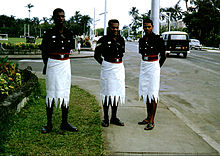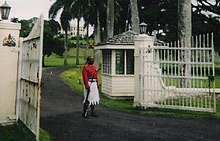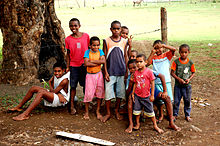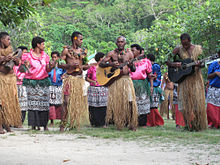Fijians
This article needs to be updated. (November 2023) |
kaiViti | |
|---|---|
| Total population | |
| c. 615,000 | |
| Regions with significant populations | |
Roman Catholic 13.3%; Assemblies of God 6.2%; Seventh-day Adventist 5.1%, other 8.8%). | |
| Related ethnic groups | |
| Papuans, Ni-Vanuatu, other Melanesian peoples, other Austronesian peoples, Indo-Fijians | |
Fijians (Fijian: iTaukei, lit. 'Owners [of the land]') are a nation and ethnic group native to Fiji, who speak Fijian and English and share a common history and culture.
Fijians, or iTaukei,
As of 2005, indigenous Fijians constituted slightly more than half of the total population of Fiji. Indigenous Fijians are predominantly of Melanesian extraction, with some Polynesian admixture.
Australia has the largest Fijian expatriate population, according to the Ministry of Pacific Island Affairs. According to the Australian census, the largest ethnic backgrounds that Fijians identified with were Indian/Indo-Fijian and Indigenous Fijian origins.
The Bose Levu Vakaturaga (
Culture

The native Fijian language belongs to the Central Pacific (Fijian – Polynesian) branch of the Austronesian family.[11] The Fijian traditions are centred around ceremonies and events, that bond the community.
Yaqona (pronounced Yang-gohna), otherwise known as kava – another important traditional custom – is an infusion prepared from the root of Piper methysticum, a type of pepper plant. The plant itself is also often referred to as yaqona or the kava plant. Yaqona is extremely important in indigenous Fijian culture – in the time of the 'old religion' it was used ceremonially by chiefs and priests only. Today, yaqona is part of daily life, both in villages and in urban areas and across all classes and walks of life. 'Having a grog' or 'drinking grog', as drinking kava is sometimes known, is used for welcoming and bonding with visitors, for storytelling sessions or merely for passing time.[citation needed]
The Tabua is a much revered whale's tooth which is used in both public and private occasions or ceremonies. The tooth is considered sacred.[12]
About 86 percent of the land in Fiji is owned by indigenous Fijian people.[13] In 1876, Sir Arthur Hamilton-Gordon, the British colonial Governor, prohibited the sale of Fijian land to non-ethnic Fijians. This policy continues today, and in 2014 the sale of freehold land to foreigners was further restricted.[14][15] The Governor also banned the employment of native Fijians as labourers, and in 1878, began importing indentured labourers from India to work in the sugarcane fields. The effects of this immigration created an ethnic polarisation and rampant Anti-Indian sentiment, which has proven to be politically challenging to Fijian race relations.[16]
Indigenous Fijians overwhelmingly report as being Christian, with the
Approximately 70% of indigenous Fijians are farmers, many of which are



History
Historically, Fijians were known as the canoe building experts of the Pacific, using them to trade with Tonga. They were usually large double-hulled canoes, called a Drua (pronounced nDroo-ah), with each side being similar except one was shorter and served as a type of outrigger. These were united by beams, with a platform on it that extended beyond the sides.[18]
- The article on the History of Fiji offers a timeline of events.
The
was founded, has added to the cultural mix. In the Later years, there was active commerce between Tonga and Fiji, and later in the history of this relationship, the Fijians in the Lau Islands (Eastern Fiji) became vassals to the King of Tonga. One particular reason Tongans and Samoans came to Fiji was to build the Drua (large double-hulled canoes) which they could not build on their own islands because of the lack of proper timber.From the early 19th century, both European and Chinese traders (dishsant visited Fiji for its sandalwood, hardwoods, beche-de-mer, marine life and, more recently, gold).[19] The British ruled Fiji from 1874 to 1970. In 1970, Fiji became a fully independent nation with constitutional arrangements to ensure that traditional Fijian interests were preserved.
The constitution was
Traditions and ceremonies

The Fijian traditions and ceremonies are historically based and share commonalities throughout time.
Name
In August 2008, shortly before the proposed People's Charter for Change, Peace and Progress was due to be released to the public, it was announced that it recommended a change in the name of Fiji's citizens. If the proposal were adopted, all citizens of Fiji, whatever their ethnicity, would be called "Fijians". At present,[when?] the word "Fijian" does not denote a nationality, and refers exclusively to indigenous Fijians. Citizens of Fiji are referred to as "Fiji Islanders". The proposal would change the English name of indigenous Fijians from "Fijians" to itaukei. The indigenous word for Fijian is "Kaiviti"[22] Deposed Prime Minister Laisenia Qarase reacted by stating that the name "Fijian" belonged exclusively to indigenous Fijians, and that he would oppose any change in legislation enabling non-indigenous Fijians to use it. The Cabinet at its meeting on 30 June 2010 approved the Fijian Affairs [Amendment] Decree 2010. The new law effectively replaces the word 'Fijian' or 'indigenous' or 'indigenous Fijian' with the word 'iTaukei' in all written laws, and all official documentation when referring to the original and native settlers of Fiji. All Fiji citizens are now called 'Fijians'.[23][24][25]
See also
- Fijian Australian
- Fijians in the United Kingdom
References
- ^ Fiji Islands Bureau of Statistics Archived 9 July 2011 at the Wayback Machine
- ^ a b "Department of Immigration & Citizenship: Media – Publications: Statistics – Community Information Summaries". Archived from the original on 13 February 2014. Retrieved 8 July 2015.
- ^ "We the People: Pacific Islanders in the United States" (PDF). US Census Bureau. August 2005. Archived from the original (PDF) on 25 August 2005.
- ^ "Immigrant status and period of immigration by place of birth and citizenship: Canada, provinces and territories and census metropolitan areas with parts". Statistics Canada. Statistics Canada Statistique Canada. 7 May 2021. Retrieved 3 January 2023.
- ^ "Fijian ethnic group". StatsNZ. Retrieved 2 January 2023.
- ^ "London Lives: The Fijian soldier". Time Out London. Archived from the original on 11 October 2012. Retrieved 18 March 2018.
- ^ "2016 Census QuickStats: Norfolk Island". Archived from the original on 7 May 2019. Retrieved 1 October 2021.
- ^ Since 2010, the word "Fijian" legally also denotes nationality and not ethnicity.
- ^ Online numbers and side table differ.
- ^ "Fijian People in New Zealand". New Zealand Ministry of Pacific Island Affairs. Archived from the original on 12 July 2007. Retrieved 19 March 2008.
- ^ Simons, Gary F. and Charles D. Fennig (eds.). 2017. "Central Pacific", Ethnologue: Languages of the World, Twentieth edition. Dallas, Texas: SIL International.
- ^ Official Fiji government site Archived 21 April 2008 at the Wayback Machine
- ^ "Land Rights in Fiji - A Sad Irony : Commentary - Native Land Trust Board". www.nltb.com.fj. Retrieved 18 March 2018.
- ^ Michael Field (13 December 2014). "Kiwis lose out in Fiji land-grab". Stuff. Retrieved 2 January 2023.
- ^ "Fiji government amends Land Sales Act to restrict foreign property ownership". ABC News. 12 December 2014. Retrieved 2 January 2023.
- ^ "The legacy of Indian migration to European colonies". The Economist. 2 September 2017. Retrieved 2 September 2017.
- ^ "Fiji 2021 International Religious Freedom Report" (PDF). US State Department. Archived from the original (PDF) on 2 January 2023. Retrieved 2 January 2023.
- ^ Elsdon Best (1925). "Canoes of Fiji". The Maori Canoe. Wellington: A. R. Shearer. p. 348 – via NZETC.
- ^ Need to finish the sentence
- ^ "The World Factbook — Central Intelligence Agency". www.cia.gov. Retrieved 18 March 2018.
- ^ "Chronology of Fijian History". www.robinsonlibrary.com. Archived from the original on 22 September 2008. Retrieved 18 March 2018.
{{cite web}}: CS1 maint: unfit URL (link) - ^ "Charter proposes common Fijian name", 4 August 2008 Archived 13 August 2008 at the Wayback Machine
- ^ "The Name “Fijian” Belongs to Indigenous – Qarase", FijiVillage, 8 August 2008
- ^ "ITAUKEI". Archived from the original on 6 November 2014. Retrieved 18 October 2014.
- ^ "Fiji Government Online Portal - Constitution". www.fiji.gov.fj. Archived from the original on 11 October 2016. Retrieved 18 March 2018.
Other sources
- De Ricci, James Herman (1875). Fiji: Our New Province in the south Seas. London: E.Stanford. p. 332. OCLC 4803267.
- Ravuvu, Asesela (1983). Vaka i Taukei: The Fijian Way of Life, Suva: University of the South Pacific
- Williams, Thomas; James Calvert; George Stringer Rose (1858). Fiji and the Fijians. Vol. 1, The islands and their inhabitants. London: Alexander Heylin. p. 266. OCLC 19529801.
